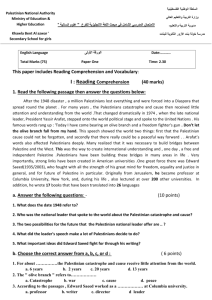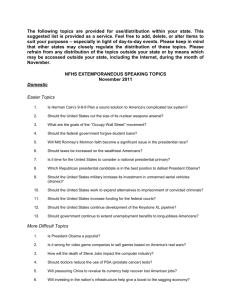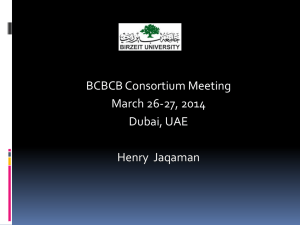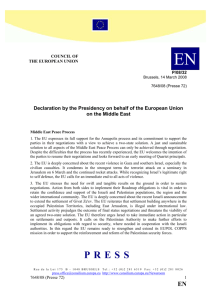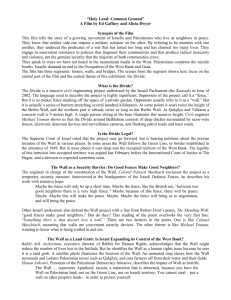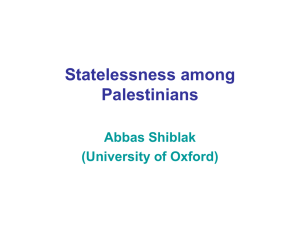Dears Fellow Health Professionals – in
advertisement
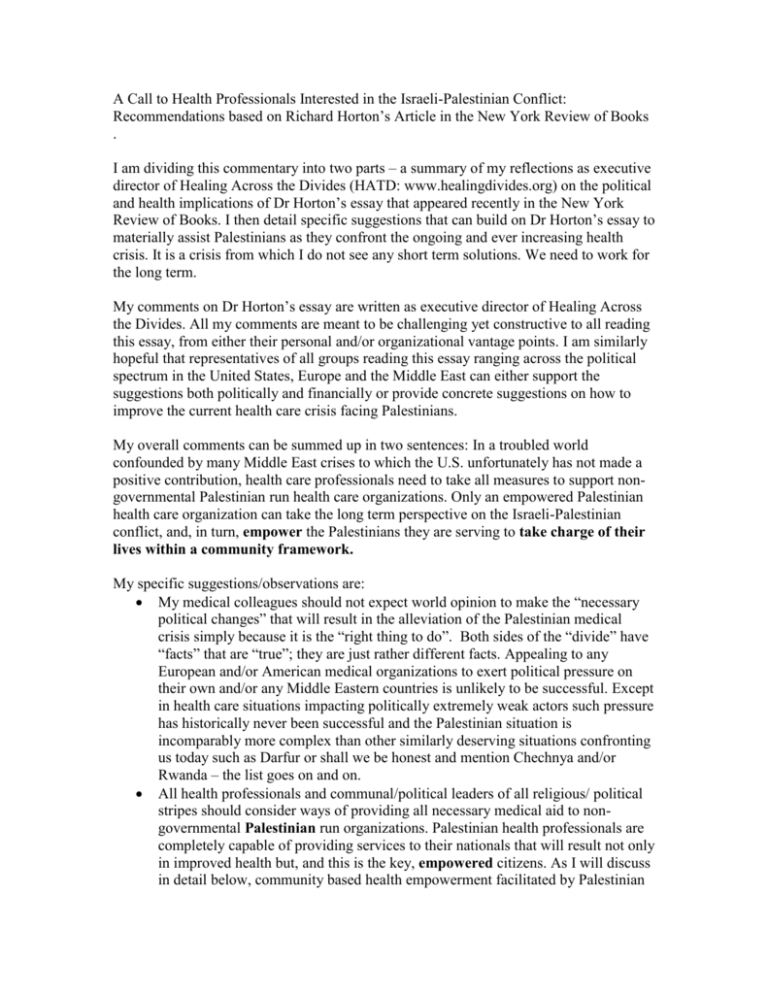
A Call to Health Professionals Interested in the Israeli-Palestinian Conflict: Recommendations based on Richard Horton’s Article in the New York Review of Books . I am dividing this commentary into two parts – a summary of my reflections as executive director of Healing Across the Divides (HATD: www.healingdivides.org) on the political and health implications of Dr Horton’s essay that appeared recently in the New York Review of Books. I then detail specific suggestions that can build on Dr Horton’s essay to materially assist Palestinians as they confront the ongoing and ever increasing health crisis. It is a crisis from which I do not see any short term solutions. We need to work for the long term. My comments on Dr Horton’s essay are written as executive director of Healing Across the Divides. All my comments are meant to be challenging yet constructive to all reading this essay, from either their personal and/or organizational vantage points. I am similarly hopeful that representatives of all groups reading this essay ranging across the political spectrum in the United States, Europe and the Middle East can either support the suggestions both politically and financially or provide concrete suggestions on how to improve the current health care crisis facing Palestinians. My overall comments can be summed up in two sentences: In a troubled world confounded by many Middle East crises to which the U.S. unfortunately has not made a positive contribution, health care professionals need to take all measures to support nongovernmental Palestinian run health care organizations. Only an empowered Palestinian health care organization can take the long term perspective on the Israeli-Palestinian conflict, and, in turn, empower the Palestinians they are serving to take charge of their lives within a community framework. My specific suggestions/observations are: My medical colleagues should not expect world opinion to make the “necessary political changes” that will result in the alleviation of the Palestinian medical crisis simply because it is the “right thing to do”. Both sides of the “divide” have “facts” that are “true”; they are just rather different facts. Appealing to any European and/or American medical organizations to exert political pressure on their own and/or any Middle Eastern countries is unlikely to be successful. Except in health care situations impacting politically extremely weak actors such pressure has historically never been successful and the Palestinian situation is incomparably more complex than other similarly deserving situations confronting us today such as Darfur or shall we be honest and mention Chechnya and/or Rwanda – the list goes on and on. All health professionals and communal/political leaders of all religious/ political stripes should consider ways of providing all necessary medical aid to nongovernmental Palestinian run organizations. Palestinian health professionals are completely capable of providing services to their nationals that will result not only in improved health but, and this is the key, empowered citizens. As I will discuss in detail below, community based health empowerment facilitated by Palestinian organizations is not only working today but is inexpensive. Delivered in measured (defined as methodical with evidence based measured impact) steps over the next few years, 100 million dollars per year would cover all aspects of community empowerment for all Palestinians. Unless Palestinians are empowered to take charge of their lives we will simply be accomplices to a worsening health care and societal crisis. For Palestinians this will result in an unimaginable epidemic of mortality from chronic illnesses behind an increasingly unseen wall of separation. Palestinian health professionals can today reverse this epidemic – if they are empowered with the necessary resources. Now for more detailed comments on Dr Horton’s essay ; 1. In an ideal world, we would adopt the social medicine perspective and take into account the nexus between health status and social/political determinants of health. Unfortunately, as someone who has worked in the region for almost thirty years, I see little future for this approach. Just as importantly, Palestinians have not internalized the fact that even if their cause is “just” that fact does not ipso facto lead to any political changes. The reason is that Israelis in power (and this applies across their political spectrum) believe that their cause is equally “just”. Israelis as a consequence have a developed a consensus that ineluctably leads to settlement expansion as part of the victim national narrative Israeli political elites adhere to. In large measure the problem is that both sides passionately believe that they own a narrative that places them in the victim position. Such a narrative demands that the other side take the initial steps toward a peace settlement. Unfortunately, to alter this scenario would require brave Israeli and/or Palestinian leaders – and such leaders do not appear to be in great supply. Alternatively, we would need clear-minded Western, particularly American, leaders who would be willing to cajole both sides into an agreement. Such political will is not on the horizon. As a consequence, conversations, for example, with the Israeli Medical Association (IMA) that are reported on in Dr Horton’s essay are unlikely to bear fruit. Most Palestinian health professionals realize the highly problematic nature of talks with the IMA. However, Palestinians still tenaciously hold to the belief that since they believe in the “justness” of their narrative, political changes represent the route to health improvement. I would encourage all of you reading this commentary to consider that an equally worthwhile road to such a Palestinian state at peace with Israel may come not only from the top down but also from the bottom up. Not from political leadership of whatever stripe down to the community – the political leadership is today nowhere to be seen in any part of the world. I encourage all Palestinian health professionals to consider spending as much political capital as possible on community empowerment in addition to the political process. Such an approach represents a road to peace that the UPMRC is already implementing with modest help from HATD. 2. Regarding practical approaches to address the ever worsening Palestinian health care crisis, Dr Horton’s essay highlights, in particular, yeoman efforts by groups such as the Union of Palestine Medical Reflief Committees or UPMRC (one of several Palestinian groups HATD supports). There is one area in particular I would highlight-the effort by health professionals, ranging from community health workers to physicians, to encourage their patients to not only believe that life is worth living but, to empower them to take charge of their lives. . The UPMRC not only helps in a clinical manner with thousands of individuals but, via community empowerment, works to improve the lives of people who even under abject circumstances are better able to care for themselves. Such an approach has the potential of impacting the entire Palestinian population. HATD has funded several projects aimed at improving the control of diabetics using the community based approach that the UPMRC has pioneered through its School of Community Health Workers. I am enclosing an article published in a peer reviewed journal that documents the impact of the initial pilot effort on several hundred diabetics. I am also enclosing part of the questionnaire that is collected on every patient – not just classical diabetes outcomes but questions pertaining to empowerment – in the final analysis trying to ascertain whether the program encourages these Palestinian diabetics to continue to want to live in light of all the challenges that they face. Ideally, HATD, together with health professionals throughout the world, would like to work under the UPMRC to dramatically increase this empowerment. .In conclusion, via HATD I continue to pursue an approach that emphasizes empowerment of Palestinian run health care organizations. Empowering these organizations in a way that results in improved health of all Palestinians will not only have a salutary impact on health, but also on the empowerment of individuals and even entire communities. Empowering a diabetic to take care of him/herself not only improves diabetes control but, more importantly, offers the Palestinian people the community basis for improving services at a local level which can then be channeled into changes at a regional or even national level. It may seem a thin reed of hope but empowerment of Palestinian run organizations (many of whom are led by health care professionals who are also political leaders) has, most importantly, the potential for sharpening existing leaders and shaping new Palestinian leaders that will take on new approaches to this ongoing conflict.
